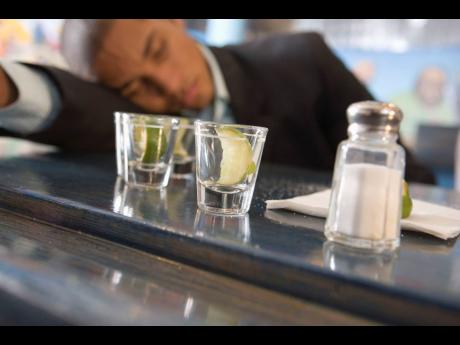Mark Wignall | Even the bars are laughing at the policy
This bar I know in the Kingston 8 area is, in the best of times, so cramped that if a man should walk in there and inside his shoes, he has athlete’s foot, within an hour, every man would be infected with ‘tinking toe’.
That is, of course, a joke, but I suspect you get the general understanding. This week, the Government has decided to experiment with a phased reopening of the sector affecting huge numbers of people operating at the bottom of society – bar operators.
It is said that there are 10,000 registered bar operators. And yet, inside many well-regulated and some haphazardly run communities, the many house bars and unregistered ones may move that number to 25,000. That is how we roll.
Guided by the relatively low number of individuals occupying and pressuring the public health system because of the global scourge of COVID-19, I believe the Government has gambled on that continuing and has bowed to pressure to free up bars and churches. One of the great fears that this country had was that the public-hospital bed count would, by this time, have been overwhelmed by the reality of COVID-19. That has not happened – not quite yet.
The Holness-led JLP administration is not that foolish to allow itself to be swayed by the belief that its good name in guiding the country through the horror of COVID-19 will last until the twelfth of never. Bar operators were bawling, and in many parishes and constituencies throughout this country, their influence moved the hand of the JLP to act, even if the plan wasn’t fully worked out.
“Mask inna bar,” said J as she laughed out. “Mi pay $30,000 fi rent fi mi bar, and right now, mi owe di man one month and don’t know how mi gwine pay him. Last week, di man call mi and ask mi if mi can even gi him $5,000.
“If my bar have three people inna it, it well pack. But man inna mask? Dat nah work.”
“So what can the Government do?” I asked her.
“Better keep it closed down and force wi fi run it illegally,” she said.
“What do you mean by that?” I asked.
“When mi run my place illegally, di man dem know di real entrance. Dem come dere and roun di side; dem nuh mix up. Dem drink an’ go home.”
“So, what must the Government do with the rest of the bars?” I asked.
“That is between the Government and dem,” she said selfishly.
JITTERS WITH HOLNESS
Of his attempt to free up the powerful religious community in Jamaica to meet weekly, commune with each other, and strengthen themselves in their collective belief, the Seventh-day Adventist (SDA) church in Jamaica has said ‘no thank you’ to the attempt at a phased reopening of the social and economic side of our realities.
Frankly, this opening up of our churches makes a mockery of what religious worship is all about. As an atheist, I do not have much concern about religion and the rites that, to me, are akin to the performance of a stage show. But I must explain that I know that worship strengthens those believers who need the regular fellowship.
Andrew Holness knows that whenever COVID-19 gives us a well-needed break sometime mid-next year, he may need to call an election. Increasingly, he is entering into a phase that is exposing his nerves to the fears of navigating the COVID-19 response without having guarantees on its periodic and ultimate trajectory.
This opening up of bars and churches for a few weeks could backfire. Bars are not places where the best example of abiding by laws is found. Indeed, the exact opposite is expected. And if that experiment fails and, instead, bars in Jamaica become the real starting points for COVID-19 to take off in the inner-city areas in the Kingston Metropolitan Area and in other dense towns and main-road communities, the PM will have his political moment to regret it.
SHORT MEMORIES ON GAMING
The entity most known for gaming or, in plain language in Jamaica, gambling, is Supreme Ventures. Before that entity gained its gaming licence in Jamaica, it heavily advertised its intention in the printed press in Jamaica, and it had to prove its integrity chops in Jamaica by identifying G-TECH, a platform running just about all top gaming outfits in the world, as its digital partner.
When Supreme began, it had to contend with Jamaica Lottery Company as, just like in the present time, there was the belief that one other player, or the idea of multiple players in the industry, would be best for the country, where tax revenue was the ultimate objective.
For a number of years in the life of both entities, the two of them lost money as too much of their budgets were spent in trying to better the other. Eventually, Jamaica Lottery Company folded, and it was acquired by Supreme.
And it was then that it became obvious to most people that one company focused like a laser on building out the best of its products would present the Government with the best opportunity to be a taxpaying money machine, the real reason for a lottery company in any country of jurisdiction.
Jamaica is a small country, and its connections at the top of the society are intensely kept secretive. When Supreme Ventures came to the Government, it had to face heavy scrutiny from Parliament. People showed up, and questions were asked, and they had to be answered.
A similar protocol must now be rediscovered, questions must be raised in public forums.
If the BGLC believes that the words that connect the time Supreme Ventures applied and the new interest by Mahoe Gaming are ‘equity’, ‘ fairness’, and’ openness’, then I say, let it happen.
- Mark Wignall is a political- and public-affairs analyst. Email feedback to columns@gleanerjm.com and mawigsr@gmail.com.

